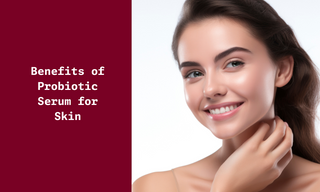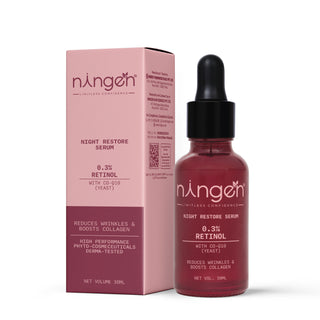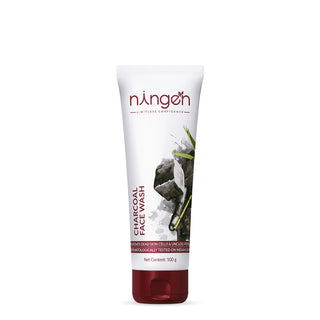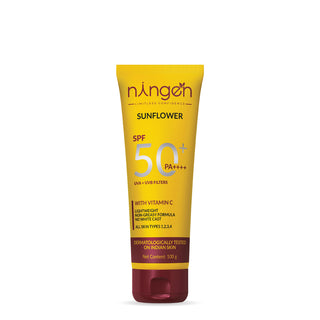In the ever-evolving realm of skincare, one ingredient has taken the spotlight for its transformative impact – probiotics. While traditionally associated with gut health, probiotics have ventured into the realm of skincare, promising a host of benefits for the skin. Probiotics, often referred to as the "good bacteria," are living microorganisms that provide a myriad of advantages when incorporated into skincare formulations. Among the various probiotic-infused products, probiotics serum stands out as a powerhouse for achieving radiant and healthy skin.
In this blog, let's explore the benefits of probiotics serum for the skin
What are Probiotics?
Probiotics are beneficial bacteria that maintain the delicate balance of the skin's microbiome, the community of microorganisms living on the skin's surface. When this microbiome is in harmony, it helps create a barrier against harmful pathogens and environmental stressors, contributing to overall skin health.
The Skin Microbiome
The skin microbiome plays a crucial role in maintaining the skin's health and appearance. Probiotics support this microbiome by promoting a diverse and balanced microbial environment. By doing so, they enhance the skin's ability to defend against external aggressors, such as pollution and UV radiation.
Different Types of Probiotics for Skin
In recent years, the skincare industry has witnessed a surge in the use of probiotics, harnessing the power of beneficial bacteria for healthier skin. Probiotics, known for their positive impact on gut health, have made their way into skincare formulations, promising a host of benefits. As we delve into the world of probiotics in skincare, it becomes apparent that not all probiotics are created equal. Different strains bring unique advantages to the table, catering to various skin concerns and needs.
Lactobacillus:
- Benefits: Lactobacillus is a versatile probiotic strain commonly used in skincare. It helps balance the skin's microbiome, promoting a healthy and resilient barrier. Lactobacillus contributes to soothing irritated skin and is effective in managing conditions like eczema and rosacea. Various skincare like cleansers, toners, serums, and moisturizers are available that are enriched with lactic acid.
Bifidobacterium:
- Benefits: Bifidobacterium is another prevalent probiotic strain with a focus on strengthening the skin's natural defenses. It aids in reducing oxidative stress, making it beneficial for anti-aging purposes. Bifidobacterium is known to enhance the overall health of the skin by promoting a robust microbiome.
Streptococcus Thermophilus:
- Benefits: This probiotic strain is valued for its ability to improve the skin's hydration levels. Streptococcus thermophilus supports the skin's moisture-retaining mechanisms, leading to a more hydrated and supple complexion. It is often included in formulations targeting dry skin.
Saccharomyces Boulardii: (yeast)
- Benefits: Saccharomyces boulardii is a yeast-based probiotic that aids in addressing acne-related concerns. It exhibits anti-inflammatory properties, helping to calm and reduce acne lesions. Additionally, it contributes to a balanced microbiome, promoting overall skin health.
- Coenzyme Q10 is a powerful antioxidant that helps neutralize free radicals, protecting the skin from oxidative stress caused by environmental factors like UV rays and pollution. It is derived from Saccharomyces. Including Coenzyme Q10 in your skincare routine can contribute to overall skin health, providing protection, rejuvenation, and a more radiant complexion.
Bacillus Coagulans:
- Benefits: Bacillus coagulans is a robust probiotic strain known for its stability and resilience. It survives harsh environmental conditions, making it suitable for skincare formulations. Bacillus coagulans helps balance the microbiome and supports the skin's defense against environmental stressors.
Lactococcus Ferment Lysate:
- Benefits: This probiotic lysate is rich in bioactive compounds that promote skin health. Lactococcus ferment lysate contributes to the strengthening of the skin barrier, reducing sensitivity and enhancing the overall resilience of the skin.
Propionibacterium Freudenreichii:
- Benefits: Often used in formulations targeting oily or acne-prone skin, propionibacterium freudenreichii helps regulate sebum production. It contributes to maintaining a balanced microbiome, reducing the risk of acne breakouts.
Yogurt Extracts:
- Benefits: Derived from fermented yogurt, yogurt extracts contain a combination of probiotics and lactic acid. These extracts provide gentle exfoliation, promoting skin renewal and brightening. They are suitable for those seeking a natural and nourishing probiotic boost.
Benefits of Probiotic Serum
Balancing the Microbiome:
- Probiotics serum works to balance the skin's microbiome, ensuring that beneficial bacteria outnumber harmful ones. This balance contributes to a more resilient and protected skin barrier, reducing the risk of issues like inflammation and sensitivity.
Calming and Soothing:
- Probiotics have anti-inflammatory properties, making them ideal for soothing irritated or sensitive skin. Probiotics serum can provide relief for conditions such as redness, and inflammation, and conditions like rosacea, promoting a calm and comfortable complexion.
Hydration Boost:
- A well-balanced microbiome is essential for maintaining optimal skin hydration. Probiotics contribute by supporting the skin's natural moisture-retention abilities, leading to a more hydrated and plump appearance.
Reducing Signs of Aging:
- Probiotics are known for stimulating collagen production, promoting skin firmness and elasticity. This can help reduce the appearance of fine lines and wrinkles, providing an anti-aging benefit to those incorporating probiotics serum into their routine.
Targeting Specific Skin Concerns:
- Probiotics serum addresses specific skin concerns, including acne and hyperpigmentation. The anti-inflammatory and antibacterial properties of probiotics can help manage acne, while their brightening effects contribute to a more even skin tone.
Enhancing Skin Barrier Function:
- By fortifying the skin's barrier, probiotics serum helps prevent moisture loss and protects against environmental stressors. This results in a healthier and more resilient skin barrier essential for overall skin well-being.
Boosting Natural Defense:
- Probiotics support the skin's natural defense mechanisms, making it more resistant to external aggressors. This enhanced defense can reduce the likelihood of skin issues and contribute to a more radiant complexion.
Improving Absorption of Other Ingredients:
- Probiotics can enhance the absorption of other beneficial ingredients in skincare products. When used in conjunction with other serums or moisturizers, probiotics serum amplifies the efficacy of the overall skincare routine.
Conclusion
Hope you found this article ‘benefits of Probiotics Serum for Skin’ useful. Probiotics serum emerges as a game-changer in the world of skincare, offering a holistic approach to achieving radiant and healthy skin. From balancing the microbiome to calming inflammation and targeting specific concerns, are diverse and impactful. As the skincare industry continues to explore the potential of probiotics, incorporating a probiotics serum into your routine can be a transformative step towards achieving the radiant and resilient skin you desire. Embrace the beauty of probiotics and unlock a new chapter in your skincare journey.
Explore our handpicked assortment of suggested items featuring probiotics in the designated category.
Frequently Asked Questions
Question 1: What are probiotics in skincare, and how do they benefit the skin?
Answer: Probiotics in skincare are beneficial bacteria that promote a healthy skin microbiome. They strengthen the skin's natural defense and support overall skin health.
Question 2: How does a probiotics serum differ from regular skincare products?
A probiotics serum contains live, beneficial bacteria that interact with the skin's microbiome, offering unique advantages like enhanced hydration, reduced inflammation, and improved skin barrier function.
Question 3: Can probiotics help with skin conditions like acne or rosacea?
Answer: Yes, probiotics can be effective in managing skin conditions. They help balance the skin's microbiome, reducing inflammation and promoting a more resilient skin barrier.
Question 4: Are probiotics suitable for all skin types, including sensitive skin?
Answer: Probiotics are generally gentle and suitable for all skin types, including sensitive skin. They work to soothe and calm the skin, making them a good option for those with sensitivity.
Question 5: How long does it take to see results from using a probiotics serum?
Answer: Results may vary, but some users notice improvements in skin hydration and texture within a few weeks. Consistent use over a more extended period can lead to more significant benefits.
Question 6: Can probiotic serums be used in combination with other skincare products?
Answer: Yes, probiotic serums are typically compatible with other skincare products. However, it's advisable to introduce new products gradually to monitor how your skin responds.
Question 7: Do probiotics help with anti-aging concerns?
Answer: Probiotics contribute to overall skin health, which can indirectly address signs of aging. They promote hydration, collagen production, and a balanced skin microbiome, all essential for youthful-looking skin.
Question 8: Are there any side effects of using probiotic serums?
Answer: Probiotics are generally well-tolerated, but some individuals may experience mild redness or irritation initially. If irritation persists, it's recommended to discontinue use.
Question 9: Can probiotic serums be used during pregnancy or while breastfeeding?
Answer: While probiotics are generally safe, it's advisable to consult with a healthcare professional before introducing new skincare products during pregnancy or breastfeeding.
Question 10: How often should a probiotics serum be applied for optimal results?
Answer: The frequency of use depends on the specific product and individual skin needs. Most probiotic serums can be applied once or twice daily for best results.











